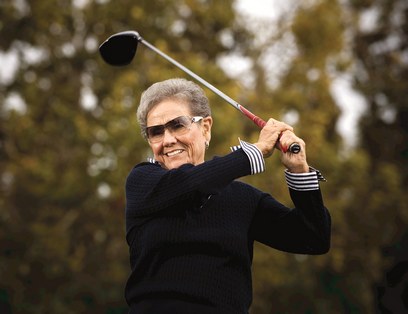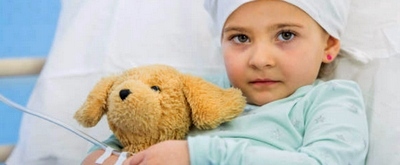The power of staying positive – and golf
Donors' gift forever links their names with cancer research

Barbara Fingerut
The first thing Barbara Fingerut did when she awoke after breast cancer surgery was to try and make a fist. Even through the pain, she was able to do so.
"Oh good," she thought. "I can still play golf."
She was out of the hospital in four days, back to work in nine days and swinging a golf club again in four weeks.
The love of golf and a determined, positive attitude have piloted Fingerut throughout life. Constantly lowering her handicap in the game she first played in her teens has matched her value for being physically active and provided a measure of achievement in the mostly male world of banking. She began her career as a bookkeeper and worked her way up to vice president and branch manager at a time when females in such positions were few.
"I play well," she says with pride. Her colleagues knew she was a powerhouse to be reckoned with, "especially when we golfed together."
Her drive to stay positive has gotten her through everything else, including the losses of her mother and husband to cancer.
"It truly is the 'big C,' but I don't let it get too big," Fingerut says.
Fingerut met her future husband, Stanley Fingerut, in Oakland, Calif., where she grew up and they both hung out in the same youth groups. Her father was a Navajo Indian and the person who inspired her admiration for hard work and wise humor. Her mother was Jewish and the person from whom she learned life's best lesson: how to enjoy it. It was a tough lesson to appreciate, however, when her mother died. Fingerut was just 18 years old.
She recalls saying at the time to her sister, "I don't think I could ever handle it," recognizing her fear of getting cancer. "But my sister said to me, 'What do you mean? Our mother could handle it, but you couldn't?' I realized that fear was no way to honor my mother. From that point on, I decided to do what I want to do today and not wait until tomorrow, because you just don't know what can happen tomorrow," Fingerut says.
Fingerut modeled her mother's strength when she learned of her own cancer. It was the 1970s, when words like "breast cancer" were not openly discussed. When reviewing treatment options, her doctor had a hard time looking her in the eyes. He talked about a standard approach for the time: a surgical biopsy to see if the lump she had found was cancer, then a second surgery for a mastectomy if it turned out that she did have breast cancer. Fingerut didn't think twice about what she said next.
"I told him, 'You've seen a lot of cancer before, so if you do this first surgery and can tell that it's cancer, take it all right then, because I'm not coming back.' I made it clear that he would have me on the operating table just one time," she says.
As a result, Fingerut had a complete mastectomy on April 19, 1977, and she has been cancer-free ever since.
"When the doctor told me after the surgery that he took everything out, he also warned me that my days of bikinis, strapless dresses and low-neck blouses were probably over," she said. "I let him know, 'That's OK, because I've never worn them before anyway.' That wasn't what mattered to me."
What did matter to her was enjoying every minute of life with the love of her life. Stan's job brought them to the Sacramento area, where they lived starting in 1965. When they weren't working, they played bridge and, at times, he joined her in a game of golf. He officiated softball, becoming umpire-in-chief for the California-Nevada-Hawaii region of the American Softball Association. They traveled the world together four times. They raised two very large dogs – a great Pyrenees and a Newfoundland. Most of the time, they laughed – a lot. Stan died of amyloidosis, an outcome of multiple myeloma, in 2001.
"Stan's wit was what first attracted me. He was a big man with an even bigger sense of humor. He had to be funny in his line of work," Fingerut says, referring to his job as a factory representative for a hosiery supplier. "When asked what he did for a living, he would say, 'I'm into ladies' pantyhose.' He made people laugh throughout his illness too."
With the exception of their dogs, the couple did not have children. So, when they started talking about wills, they had a big decision: To whom would they leave their assets?
"We realized that we consider the university to be our child," she said. "This is where Stan's disease was treated with compassion and quality. This is where we feel like family."
As a result, Fingerut has promised that, upon her death, UC Davis Comprehensive Cancer Center will receive stock and funds totaling $1.5 million to establish the Stanley Allan Fingerut and Barbara Esquibel Fingerut Endowed Chair in Cancer Research.
Endowments are highly valued by the university for their recruitment power, and Fingeruts' commitment to an endowment is especially appreciated by the cancer center.
"Our job is to continuously improve on what we do by hiring and retaining the world's best clinicians and researchers," says Ralph deVere White, the cancer center's director. "Barbara and Stan's gift is a major contribution toward that effort and will help us quickly advance our research program by bringing even more top talent to our UC Davis cancer team. Barbara's leadership and the example she sets in establishing the endowment are a great honor to us."
Fingerut appreciates the longevity of her gift and the hope it offers others as well.
"Both of my family names – 'Fingerut' and 'Esquibel' – will be permanently associated with cancer research and the university, and that means a lot to me," she says. "The endowment is also my hope that our money can help others with cancer. I am very lucky. I am a longtime survivor. And I want others to be very lucky too."


